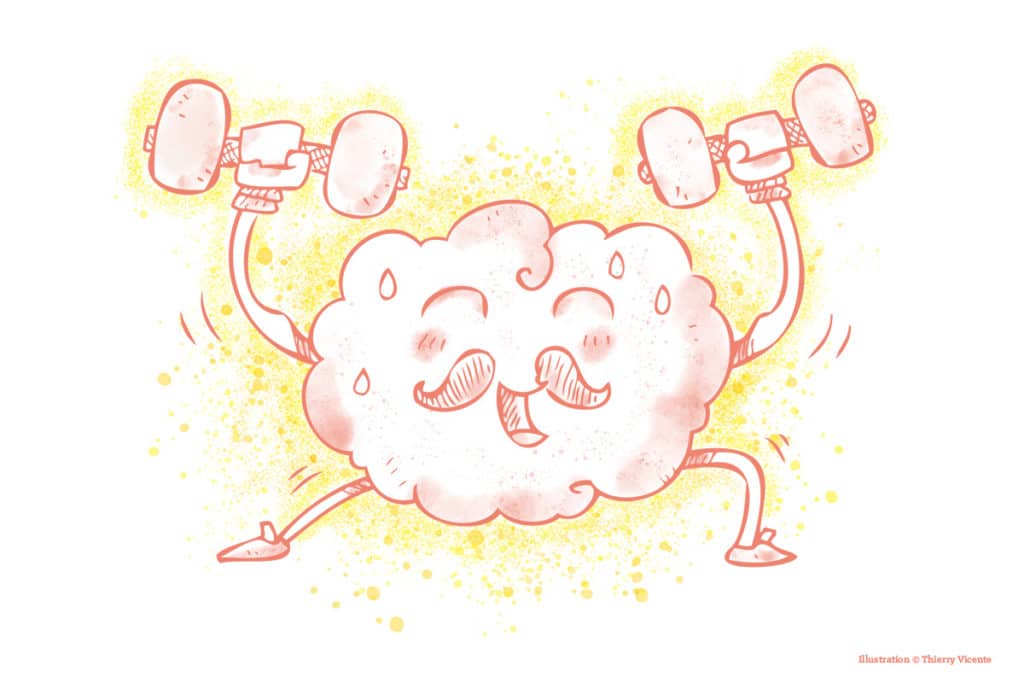[LUM#3] Routine, the killer of neurons
At what age does the brain begin to age? "When we are born," replies Jacques Touchon. It is an inevitable process, but one that can be slowed down with a simple combination of intellectual stimulation, physical activity, social contact, and a Mediterranean diet.

When skin ages, wrinkles appear. When hair ages, it turns gray, then white, or sparse. But when the brain ages, what happens? "The speed of information processing slows down, it becomes more difficult to multitask and focus your attention," explains Jacques Touchon. Why? For a long time, it was believed that our stock of neurons was fixed at birth and that it inevitably decreased over time, leading to a decline in cognitive abilities. "But we now know that this is not the main cause of brain aging and that new neurons can appear in certain structures such as the hippocampus," says the neuropsychiatrist.
Mysterious aging
So why does the brain age? "Brain aging remains something of a mystery,"repliesJacques Touchon. " But we know that the brain bears the scars of all the trials and tribulations it has endured throughout life." Brain trauma, vascular lesions, and the effects of toxic substances such as alcohol are all factors that accumulate throughout life and impact brain function. Just as some people start losing their hair as soon as they reach adulthood while others keep a full head of hair throughout their lives, we are not all equal when it comes to brain aging."We don't all have the same genetic makeup to resist the aging process," says Jacques Touchon.
While we cannot change our genetic makeup, we can help slow down the aging process... How? Partly through a phenomenon called brain plasticity."When the brain is stimulated, it develops new synaptic connections and new networks," explains Jacques Touchon. This creates a "brain reserve" that compensates for the deterioration of functional networks caused by brain damage. This reserve begins to build up in childhood and can continue to be nurtured throughout life.
Stimulate your brain
And there's no mystery to stimulating the brain: you have to use it."People who have engaged in intellectual exercise throughout their lives are less likely to develop Alzheimer's disease, a pathological form of brain aging that causes memory and behavioral disorders and progresses to dementia," explains the neuropsychiatrist. This disease is characterized by abnormal deposits of two proteins in the brain that cause damage."People who have stimulated their brains throughout their lives may well have deposits of these proteins, but in them it does not cause cognitive decline," says Jacques Touchon. A well-trained brain "compensates" for these lesions thanks to its extraordinary neural plasticity, which remains the best weapon against aging.
A weapon that should be used without hesitation, even in the absence of any illness: "Older people who engage in intellectually stimulating leisure activities experience a significantly slower decline in cognitive function," adds Jacques Touchon. Intellectually stimulating leisure activities? "Playing bridge, doing crossword puzzles, reading, or attending a senior citizens' club." According to the specialist, the situation that stimulates the brain the most is meeting new people and experiencing new things. "Routine is a neuron killer. If tomorrow is the same as today, then the brain is in danger."
The enemies of your brain
Every time our brain suffers damage, it ages. Can we preserve its youthfulness by limiting the occurrence of such damage? "It's possible by reducing vascular risk factors, which are the main causes of brain damage," replies Jacques Touchon. Preventing or correcting high blood pressure, high cholesterol, diabetes, obesity, stress, a sedentary lifestyle, smoking, and alcohol consumption can slow down the aging of the brain. Researchers have also found that regular physical activity helps slow cognitive decline.
The virtues of the Mediterranean diet
Studying the relationship between vascular risk factors and dementia: this is the subject of research known asthe"Three Cities Study."Starting in 1999, 10,000 people over the age of 65 were followed for 10 years in Montpellier, Bordeaux, and Dijon. By studying the participants' eating habits, the researchers found that those who followed a Mediterranean-style diet were less likely to experience cognitive decline."This type of diet slows down brain aging," explains Jacques Touchon. On the menu: fruit, vegetables, and fish seasoned with a generous amount of olive oil, accompanied by one or two glasses of red wine a day. Where do the benefits of the Mediterranean diet come from? "Probably from the micronutrients found in this type of diet, such as omega-3 and vitamins B and E, which have an antioxidant effect and help limit brain damage."
Find UM podcasts now available on your favorite platform (Spotify, Deezer, Apple Podcasts, Amazon Music, etc.).